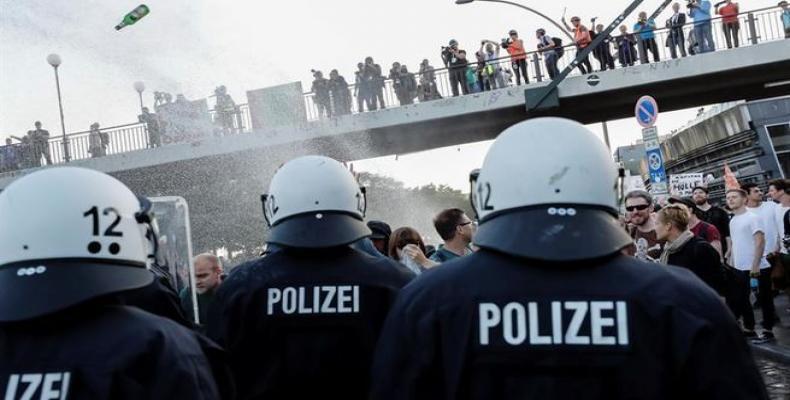Hamburg, July 10 (RHC)-- A summit of 20 industrialized countries wrapped up in the German city of Hamburg over the weekend, but protests against capitalism and corporatism continued in the city.
Leaders from the G-20 countries, who had gathered in Hamburg for the 12th summit of the group, concluded their meeting with an extraordinary communiqué that both exposed major differences among members and sought to preserve unity.
Divisions had been expected between the 19 members that have typically sought to promote free trade and the United States, whose new administration has pulled out of a global climate accord and adopted protectionist trade policies.
The final document spelled out the disagreement with the United States over the climate deal and clearly stated Washington’s intention to continue using and selling fossil fuels -- a main cause of global warming.
But the text, over which much haggling took place, also sought to placate the U.S. by acknowledging for the first time the right of countries to protect their markets with “legitimate trade defense instruments.” That wording has been taken to mean a condoning, even if reluctant, of U.S. President Donald Trump’s protectionist policies.
According to the document, the U.S. agreed, in return, to work closely with other countries to help them access and use fossil fuels more cleanly and efficiently. U.S. officials had reportedly worked to incorporate that language in an attempt to prevent the U.S. from looking too isolated at the G-20.
But the rather mild reaction to Washington’s withdrawal from the climate deal and Trump’s protectionist policies meant that other countries would be emboldened to take a non-conformist stance, too.
Turkish President Recep Tayyip Erdogan said his country may not ratify the climate agreement, which was negotiated in the French capital of Paris and has been ratified by 153 countries.
“After that step taken by America, the position that we adopt is in the direction of not passing it in parliament,” Erdogan said, referring to the Paris accord. He also suggested some other G-20 countries had a “problem” with the agreement. He did not name those countries.
Meanwhile, Hamburg witnessed protests before, during, and after the G-20 summit. Clashes broke out between demonstrators and security forces early on Sunday in the streets of the German city despite the conclusion of the summit.
Denouncing globalization and corporate greed, the protesters threw bottles and rocks at security forces and burned cars, trash piles, and street barricades set up by themselves. Police were forced to resort to water cannons, pepper spray, and tear gas to disperse them.
Over the three days of the summit, more than 200 police officers have been injured and some 143 people have been detained, according to the most recent figures. The protests had begun in Hamburg a week ahead of the summit.
G-20 Summit Wraps Up As Protests Continue in Hamburg

Matérias relacionadas
Comentários
Deixe um comentário
Todos os campos são requeridosMais vistas
- Festival Internacional do Cinema Pobre de Gibara
- Playa Girón: a vitória de Cuba sobre o imperialismo
- As particularidades do tráfico de pessoas não se aplicam às missões de saúde cubanas
- Díaz-Canel participa da cerimônia pela declaração do socialismo em Cuba
- Relembram ataques aéreos dos EUA contra Cuba há 64 anos

